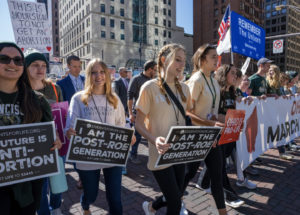Some blue states are requiring universities to provide chemical abortions on campus
(Daily Caller) – Lawmakers in blue states across the country are passing laws to require public universities to provide chemical abortions on campus.
A new California law took effect on Jan. 1…

(Daily Caller) – Lawmakers in blue states across the country are passing laws to require public universities to provide chemical abortions on campus.
A new California law took effect on Jan. 1 requiring all public university health systems in the University of California and California State University systems to stock abortion pills. Massachusetts passed a similar law to ensure students have immediate access to abortion while New York is considering similar measures.
The California law, signed by Democrat Gov. Gavin Newsom in 2019, has been used as a blueprint for other states to safeguard on-campus abortion access in wake of the overturn of Roe v. Wade. The law requires all 33 schools in the UC and CSU system to stock “abortion by medication techniques at on-campus student health centers.”
“California has 150 abortion clinics, taxpayer-funded abortion, and no shortage of abortion access. Mandating that state universities dispense abortion drugs is nothing more than lethal virtue-signaling by California politicians who prioritize delivering a dead baby over a live one,” Mary Rose Short, California Right to Life director, told the Daily Caller News Foundation.
UC Santa Barbara has written 50 prescriptions for students to receive abortion pills since they were stocked on campus in April 2022, Politico reported.
“I believe abortion is health care, and it’s important to show students that it’s normal and something they should expect and demand,” Kellie DeLozier, an OBGYN at the UCSB health center, told Politico.
Angie Magaña, a nurse practitioner at UCSB, told Politico that no one refused to prescribe the pill after staff participated in a workshop to address any concerns.
“We told them: This is just part of the range of services that we provide now and you can leave your personal beliefs at home,” she said. “We said: Really what you’re doing is giving students the safer option. And when we talk about it like that, most people say okay.”
Students for Life of America (SLFA), a national organization dedicated to banning abortion, made educating students about the abortion pill one of its top priorities, Dana Stancavage, SFLA press strategist, told the DCNF. She praised Republican Rep. Chip Roy of Texas for introducing a bill to defund universities which promote abortion in “SFLAction-inspired legislation called the Protecting Life on College Campus Act.”
“We’re closely monitoring news out of California as we want to see life protected in law and women provided with the full facts of Chemical Abortion which is four times more dangerous than surgical abortion and can lead to injury, infertility, death, and misuse from sexual abusers,” she said.
In Massachusetts, the abortion pill became a required medication available at student health centers after House Bill 5090 was signed into law by former Republican Gov. Charlie Baker in July 2022. The bill requires colleges and universities to adopt a “medication abortion readiness plan” which details how an institution will “provide medication abortions to students or assist students in obtaining medication abortions,” according to its text.
“Following the Supreme Court’s decision in Dobbs last summer, lawmakers here passed a bill they claimed would expand access to ‘care’ young women need. So while women under 21 cannot legally purchase alcohol, they can ingest pills, given to them by medical professionals, in their dorm rooms, only to deliver their deceased children into dorm toilets hours later,” Myrna Maloney Flynn, president of Massachusetts Citizens for Life (MCFL), told the DCNF.
In response, MCFL installed two billboards along a high-traffic route towards University of Massachusetts (UMass) Medical School and Worcester State University promoting pro-life ideas.
MCFL also advocated for bill being considered in the legislature that, if passed, would require abortion pill providers to also inform women about the Abortion Pill Reversal (APR).
While not yet law in New York, legislators are looking to make the blue state, already a known abortion sanctuary, the next to require public campuses to provide medication abortion. Democratic Gov. Kathy Hochul said in early January she intends to ensure that all State University of New York (SUNY) and City University of New York (CUNY) institutions offer abortion pills on campus or establish a relationship with a local clinic to refer students for abortion services.
“SUNY campuses offer a wide array of medical services for the hundreds of thousands of students in need of medical attention,” Holly Liapis, assistant vice chancellor of communications & press secretary for SUNY, previously told the DCNF. “For students seeking reproductive health care, our campus medical staff offer easy access to services that may include abortion medication, along with referring students to nearby reproductive health providers to provide a full spectrum of services.”
Barnard College, located in New York, announced in October it would stock abortion pills on campus by the fall 2023 semester.
“Barnard applies a reproductive justice and gender-affirming framework to all of its student health and well-being services, and particularly to reproductive healthcare,” Barnard said in a statement provided to the DCNF. “In the post-Roe context, we are bolstering these services.”
Other institutions, including most recently George Washington University, install vending machines where students can quickly access Plan B.
Ohio State University Undergraduate Student Government handed out free Plan B to students on Jan. 25, according to an Instagram post. Pro-life students reportedly protested the event and held signs warning attendees that Plan B “can end a human life” and advertising pro-life resources.
UCSB, Barnard College, Hochul, GWU, OSU and OSU USG did not immediately respond to the DCNF’s request for comment. DeLozier and Magaña could not be contacted for comment.



